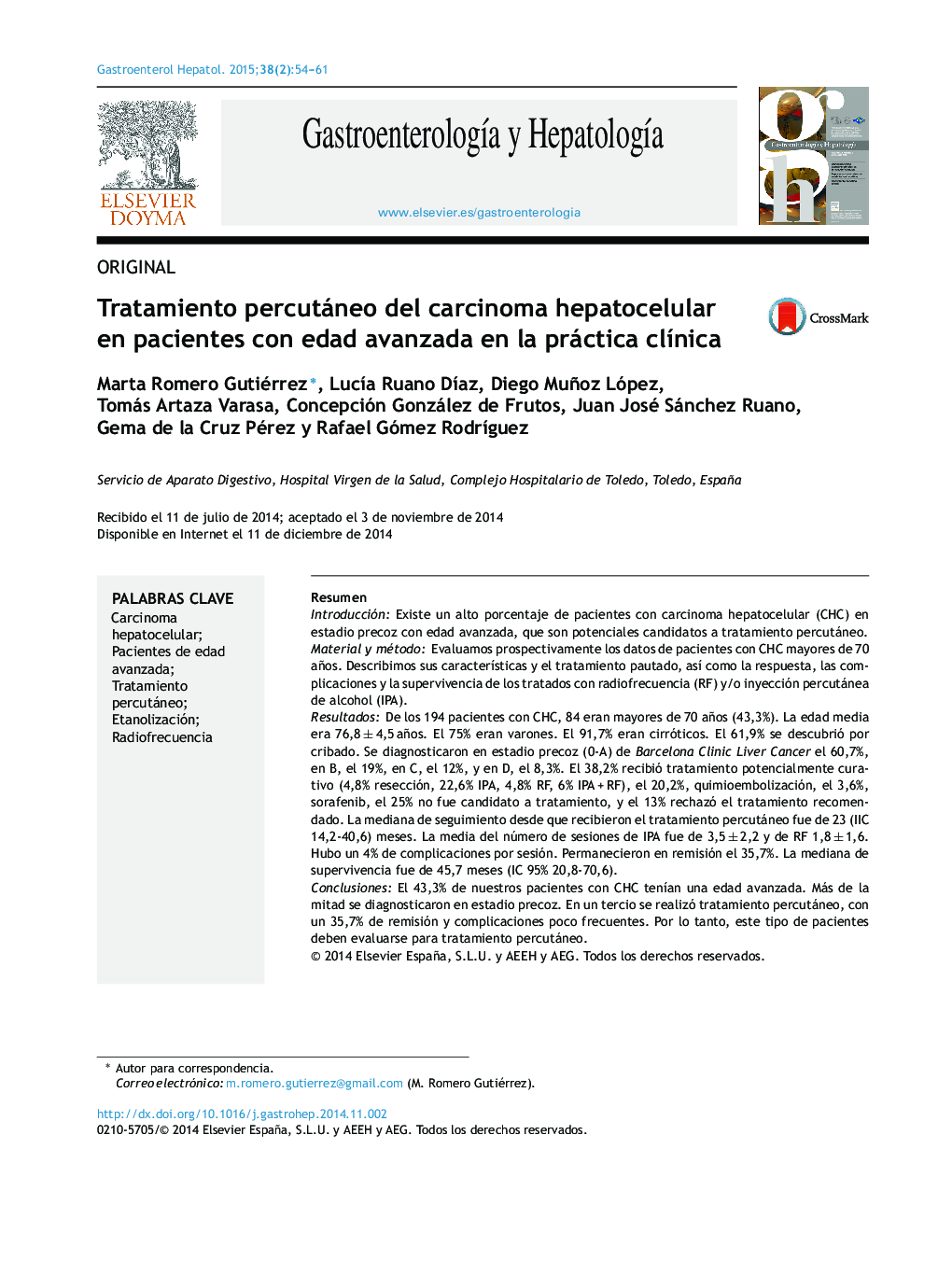| کد مقاله | کد نشریه | سال انتشار | مقاله انگلیسی | نسخه تمام متن |
|---|---|---|---|---|
| 3287821 | 1209464 | 2015 | 8 صفحه PDF | دانلود رایگان |
ResumenIntroducciónExiste un alto porcentaje de pacientes con carcinoma hepatocelular (CHC) en estadio precoz con edad avanzada, que son potenciales candidatos a tratamiento percutáneo.Material y métodoEvaluamos prospectivamente los datos de pacientes con CHC mayores de 70 años. Describimos sus características y el tratamiento pautado, así como la respuesta, las complicaciones y la supervivencia de los tratados con radiofrecuencia (RF) y/o inyección percutánea de alcohol (IPA).ResultadosDe los 194 pacientes con CHC, 84 eran mayores de 70 años (43,3%). La edad media era 76,8 ± 4,5 años. El 75% eran varones. El 91,7% eran cirróticos. El 61,9% se descubrió por cribado. Se diagnosticaron en estadio precoz (0-A) de Barcelona Clinic Liver Cancer el 60,7%, en B, el 19%, en C, el 12%, y en D, el 8,3%. El 38,2% recibió tratamiento potencialmente curativo (4,8% resección, 22,6% IPA, 4,8% RF, 6% IPA + RF), el 20,2%, quimioembolización, el 3,6%, sorafenib, el 25% no fue candidato a tratamiento, y el 13% rechazó el tratamiento recomendado. La mediana de seguimiento desde que recibieron el tratamiento percutáneo fue de 23 (IIC 14,2-40,6) meses. La media del número de sesiones de IPA fue de 3,5 ± 2,2 y de RF 1,8 ± 1,6. Hubo un 4% de complicaciones por sesión. Permanecieron en remisión el 35,7%. La mediana de supervivencia fue de 45,7 meses (IC 95% 20,8-70,6).ConclusionesEl 43,3% de nuestros pacientes con CHC tenían una edad avanzada. Más de la mitad se diagnosticaron en estadio precoz. En un tercio se realizó tratamiento percutáneo, con un 35,7% de remisión y complicaciones poco frecuentes. Por lo tanto, este tipo de pacientes deben evaluarse para tratamiento percutáneo.
IntroductionA high percentage of older patients with early-stage hepatocellular carcinoma (HCC) are potential candidates for percutaneous ablation.Material and methodsWe prospectively assessed data from patients older than 70 years with HCC. We determined their demographic and clinical characteristics, the treatment provided and the response, complications and survival among those treated with radiofrequency ablation (RFA) and/or percutaneous ethanol injection (PEI).ResultsOf 194 patients with HCC, 84 were older than 70 years (43.3%). The mean age was 76.8 ± 4.5 years. Seventy-five percent were male and 91.7% had cirrhosis. Cancer was initially identified by a surveillance program in 61.9%. According to the Barcelona Clinic Liver Cancer staging system, 60.7% were classified as having early stage cancer (0-A), 19% as stage B, 12% as stage C, and 8.3% as stage D. Potentially curative initial treatment was provided in 38.2% (surgical resection in 4.8%, PEI in 22.6%, RFA in 4.8%, PEI + RFA in 6%), transarterial chemoembolization in 20.2%, and sorafenib in 3.6%. Twenty-five percent of patients were not treatment candidates and 13% refused the recommended treatment. The median follow-up after percutaneous ablation was 23 months (IQR 14.2-40.6). The mean number of sessions was 3.5 ± 2.2 for PEI and 1.8 ± 1.6 for RFA. The complications rate per session was 4%. Remission was achieved in 35.7%. The overall median survival was 45.7 months (95% CI 20.8-70.6).ConclusionsAlmost half of the patients with HCC in our sample were elderly and more than half were diagnosed at an early stage. Percutaneous ablation was performed in one-third of the sample, achieving remission in 37.5%. There were few complications. Therefore, these patients should be assessed for percutaneous ablation.
Journal: Gastroenterología y Hepatología - Volume 38, Issue 2, February 2015, Pages 54–61
